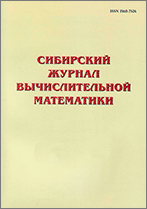|
Development of a metaheuristic programming
method for the nonlinear models synthesis
O. G. Monakhov, E. A. Monakhova
Institute of Computational Mathematics and Mathematical Geophysics, Siberian Branch,
Russian Academy of Sciences, Novosibirsk, Russia
Abstract:
The solution of the problem of building nonlinear models (mathematical expressions, functions, algorithms,
programs) based on an experimental data set, a set of variables, a set of basic functions and operations is
considered. A metaheuristic programming method for the evolutionary synthesis of nonlinear models has been
developed that has a representation of a chromosome in the form of a vector of real numbers and allows the use
of various bioinspired (nature-inspired) optimization algorithms in the search for models. The effectiveness of
the proposed algorithm is estimated using ten bioinspired algorithms and compared with a standard algorithm
of genetic programming, grammatical evolution and Cartesian Genetic Programming. The experiments have
shown a significant advantage of this approach as compared with the above algorithms both with respect to
time for the solution search (greater than by an order of magnitude in most cases), and the probability of
finding a given function (a model) (in many cases at a twofold rate).
Key words:
metaheuristic programming method, genetic algorithm, genetic programming, grammatical
evolution, Cartesian Genetic Programming, nonlinear models, bioinspired algorithms.
Received: 04.12.2018
Revised: 05.04.2019
Accepted: 16.07.2020
Citation:
O. G. Monakhov, E. A. Monakhova, “Development of a metaheuristic programming
method for the nonlinear models synthesis”, Sib. Zh. Vychisl. Mat., 23:4 (2020), 415–429; Num. Anal. Appl., 13:4 (2020), 349–359
Linking options:
https://www.mathnet.ru/eng/sjvm757 https://www.mathnet.ru/eng/sjvm/v23/i4/p415
|

| Statistics & downloads: |
| Abstract page: | 196 | | Full-text PDF : | 75 | | References: | 27 | | First page: | 12 |
|




 Contact us:
Contact us: Terms of Use
Terms of Use
 Registration to the website
Registration to the website Logotypes
Logotypes









 Citation in format
Citation in format 